Feeling lost in life or your career?
You’re not alone.
I’ve felt lost many times in the past. From struggling to figure out who I was to feeling lost in my career. And more recently, due to losses in my relationships.
You see, there’s one guarantee when you live life: you’ll lose yourself at some point. Life happens in cycles, just like the seasons in a year.
The good news?
Although you might feel stuck in a rut and wonder if you’re ever going to get out of this situation, the winter season has its purposes. When you’re feeling lost, it’s a sign that you’re searching for greater meaning and purpose.
Today, we’ll cover 9 counterintuitive but effective coping strategies on what to do when you feel lost.
So let’s dive in!
- Why I felt lost in the past
- Why do you feel lost in life?
- 7 Benefits of feeling lost in life
- 9 Characteristics of feeling lost
- 9 Coping strategies when you feel lost
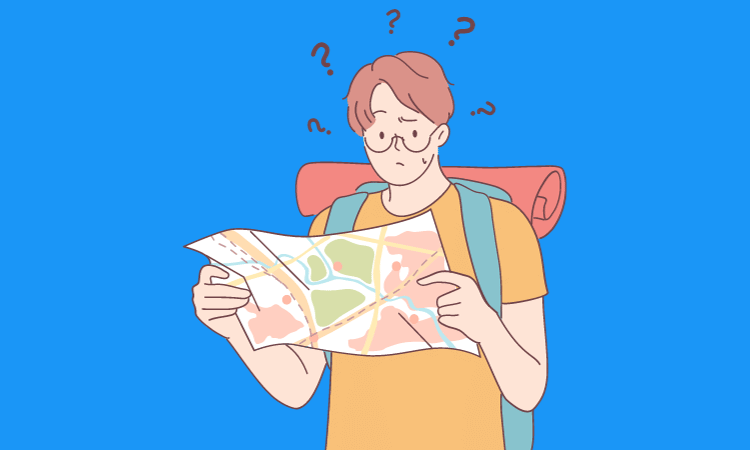
Why I felt lost in the past – and still do today
I was depressed and lost often during my teenage years – but struggled to identify why…
I had everything a young adult needs: a good education, good health, a thriving social life, and even a comfortable financial environment.
Yet, I felt unhappy.
Today, it seems obvious to me. After years of self-discovery, I learned that I didn’t really know and accepted myself. Instead, I tried to please people and live up to society’s expectations.
Today, life’s different.
I work as a freelancer, I enjoy what I do, and I’ve got the freedom I always desired to travel the world and work on satisfying projects like this blog.
I always dreamt about this lifestyle – and now I’m living it.
But if you think that feeling lost is an emotion of the past – you’re dead wrong.
You see, I just experienced a breakup and feel quite lost. Naturally, I question my life’s direction and wonder what to do next.
An existential crisis is common when a massive change occurs.
However, there’s a difference.
Today, I’m quite okay feeling this way.
You see, I’ve been here before. And I know that I’m now well-equipped with the coping strategies you’ll read about later.
I also know that there’s transformative power in moments like these. If you feel lost, it can be a blessing in disguise. But more about that later…
Let’s first uncover…
Why do you feel lost in life?
Major life changes can lead to uncertainty and frustration. Here are some of the biggest reasons that can cause you to feel lost in life:
- No purpose or direction: Lacking clear goals or objectives can make your life feel aimless, whether it’s due to uncertainty about your desires, lacking a clear plan, or even after achieving your goals.
- Life transitions: Significant events like graduating, shifting careers, or moving to a new city are challenging and can even cause changes in your identity. You may feel disoriented or adrift when this happens.
- Personal losses: Losses such as the death of a loved one, breakups, or the ending of friendships can disrupt your social life. They may create a void and leave you feeling directionless and lonely.
- Overwhelming choices or decisions: Modern life offers (too) many options and you may experience paralysis by analysis. The fear of incorrect decision-making can result in frequent indecision.
- Disconnection from self due to societal pressure: Conflicting messages between your desires and societal expectations can cause difficulties in aligning your life path with external demands.
- Internal struggles between desire and fear: Wanting to pursue your dreams but fearing change, constantly comparing yourself to others, and struggling with unmet expectations can all lower your self-worth and extend your experience of being lost.
It’s important to remember that feeling lost isn’t a sign of failure, but rather a natural consequence of your quest for meaning and joy. Believe it or not, I experienced my greatest breakthroughs when I felt lost.
7 Benefits of feeling lost in life
Pain, frustration, and other negative emotions are often the most powerful catalysts for positive change. I doubt that I would ever be where I am today if it wasn’t for the fact that I felt so lost as a teenager.
Frustration started my journey for growth.
It instilled an inner drive to experience more purpose, meaning, and joy.
You see, there’s nothing that forces you to rethink your life’s journey when everything goes well. But when you feel lost and out of your depth, you’re forced to learn, adapt, and rethink your future.
Feeling lost can provide your greatest opportunity for personal growth, success, and ultimately, a happy and fulfilling life.
Quick list of the hidden benefits of feeling lost
Here are the most important but hidden benefits of feeling lost in life:
- The catalyst for change: Pain causes you to reevaluate your options, seek new experiences, and explore opportunities.
- Self-discovery: Being lost forces introspection, helping you understand your core values, motivations, and deepest desires.
- Re-alignment: Feeling lost forces you to pause and reflect on whether your current path aligns with your true self.
- Resilience: Navigating through uncertainty builds emotional strength and your capability to deal with future challenges.
- Empathy: Personal struggles can make you more understanding, compassionate, and relatable to others in similar circumstances.
- Creativity: Uncertainty can ignite new ideas and innovative thinking.
- Motivation: Discomfort and pain can inspire massive action.
Like I said before, I’m grateful for the moments when I feel lost.
They serve as wake-up calls to take a step back from my routine and reevaluate whether my actions still align with the vision for my life.
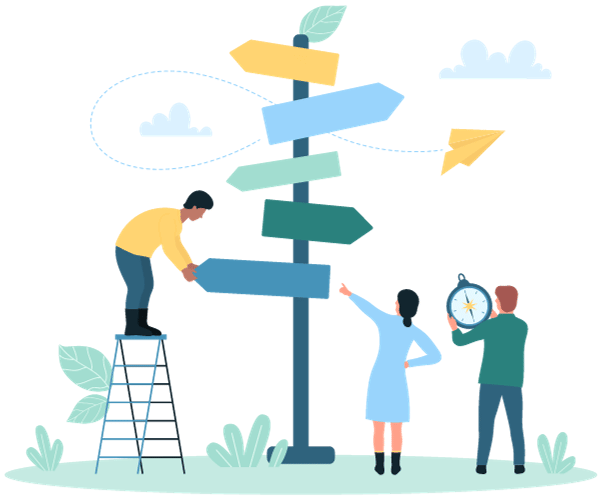
9 Characteristics of feeling lost
When you’re lost, you often feel overwhelmed by emotions and options, clouding your clarity and judgment. And it can cause chaos inside your head.
That’s why you should first take a step back and entangle the web.
Here are the most common elements that can cause you to feel lost:
- Uncertainty: You often doubt your current direction in your life.
- Lack of clarity: You struggle to identify your goals or next steps.
- Self-questioning: You constantly question your thoughts and decisions.
- Discomfort: You experience frequent emotional unease or distress.
- No motivation: You’re losing interest for what you once enjoyed.
- Restlessness: You feel unsettled and urge for change.
- Loneliness: You feel misunderstood and alone in your experience.
- Desire for change: You feel the need for change, even if you’re unable to identify the desired outcome or difference you seek to make.
- Search for meaning: You wonder about and search for a deeper significance in your life and work.
When you’re feeling lost, you might feel like you’re trapped forever.
This experience is known as the recency bias, which states that you tend to believe that what happened most recently will remain forever – both positive and negative events.
But remember that everything happens in cycles.
And, feeling lost is merely a winter season in life.
That said, there are several ways to endure these challenging phases of your life, similar to how you would wear a thicker coat during the colder months.
9 Coping strategies when you feel lost
The experience of being lost can flood you with uncertainty. But it can also provide your greatest opportunity for personal growth and change.
You see, I still struggle with my winter seasons too.

The key difference is that I’m confident in my ability to deal with it. I’m now more self-reliant and use negative emotions as a catalyst for positive change, not internal destruction.
And, you can too.
Here’s how:
#1: It’s okay to feel lost
Feeling lost in life is something we all go through at some point, and that’s okay. It’s not a personal failing, but rather a part of the human experience.
You see, no one has everything figured out…
…even if it seems that way on social media.
Everyone feels lost sometimes. Acknowledging this feeling is the first step to making change happen. The second step is to accept that it’s okay to feel lost.
Only when you acknowledge and accept that it’s okay to feel lost, can you begin to handle it with compassion rather than criticism.
In fact, this level of awareness is so important that I would urge you to make it a regular private practice – even once you find your way again.
Powerful habits to check in with yourself:
- Use daily journaling ideas to reflect on your feelings. In addition, check out the best self-help journals or the best journals with prompts, categorized by specific goals and needs.
- Write Morning Pages, a powerful morning routine practice to unblock creativity as described in Julia Camerson’s book: The Artist’s Way.
- Talk about your experiences and feelings with your best friend, your parents, or any other close people you trust.
- Go for a solo hike to explore your thoughts and feelings.
Acknowledgment and acceptance are always useful first steps to realize positive change, especially when you feel stuck.
#2: Embrace uncertainty
While acceptance is the first step, a powerful addition is to embrace change and uncertainty.
That may feel counterintuitive but hear me out:
While we often label negative emotions as bad, they’re not. Objectively speaking, they’re merely signals telling you what’s happening right now.
All emotions provide signals.
And, negative emotions often signal moments of great opportunity.
Losing your job, feeling stuck in your career, and experiencing a breakup all provide opportunities to reinvent yourself. Although challenging, these situations can become the greatest catalysts for change and personal growth.
Yes, it’s scary.
No one likes feeling overwhelmed.
But if you can sit with it, this moment can be an exciting opportunity too.
The beauty of uncertainty is that it often leads you down paths you would never venture into otherwise. And often, many good things stem from that.
Shift your perspective from fearing the unknown to perceiving it as a unique opportunity with untapped potential, and you’ll open yourselves up to a new world of possibilities.
Of course, easier said than done.
But it’s worth stressing this point to yourself – and do it often. If you want to embrace uncertainty as a regular practice, you can meditate and visualize a new you and the new possibilities for your life.
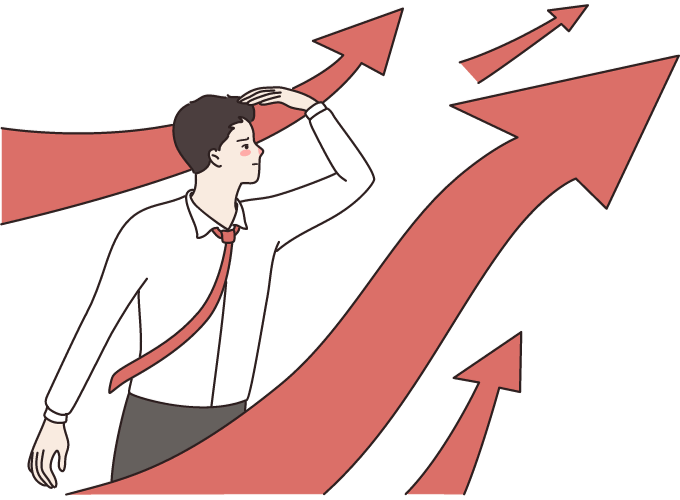
#3: Schedule Personal Clarity Sessions
In the hustle and bustle of daily life, it’s easy to lose touch with your feelings, purpose, and authentic self.
That’s why you need Personal Clarity Sessions.
A clarity session is a dedicated block of undisturbed time to sit down and reflect on your thoughts, feelings, goals, and direction in life.
This idea consists of a simple 2-step process:
- Gain clarity.
- Strategize your next steps.
This session will help you to reconnect with what matters most to you. And it helps you to identify if you’re still aligned with your values and goals.
Start by carving out an hour each week, and guard it as if it’s a very important meeting. Block any potential disruptions and use this time to think, write, plan, and most importantly, tune into your intuition and inner voice.
#4: Identify your priorities
It’s important to clarify your priorities regularly, especially when you’re feeling overwhelmed by options and choices.
Identifying your priorities enables you to cut through the noise and bring a sharp focus to your life.
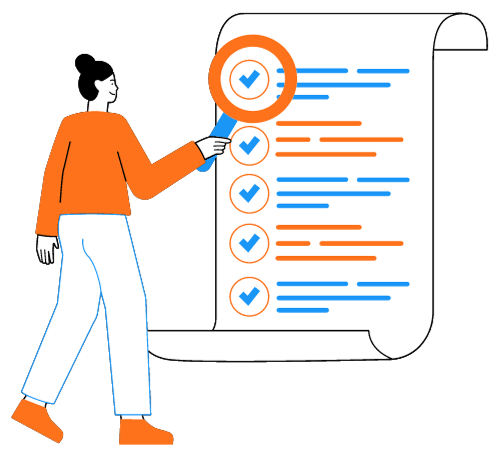
It will help you simplify your decisions.
The next step is to chunk down your priorities into tiny actions. Acting on those tasks will create momentum and provide a sense of control.
Once again, it sounds simple on paper.
And to a degree, it is.
The problem is that people expect their problems to disappear overnight.
But never expect change to happen fast when you feel lost. This process takes time, similar to how any winter season takes a few months to pass.
#5: Prioritize basic self-care
People tend to seek shortcuts and forget about the basic stuff.
When experiencing uncertainty, you easily overlook the simple yet crucial aspects of a daily healthy routine. Think about staying active, maintaining your relationships, and nourishing your body with wholesome, healthy food.
Basic self-care forms the cornerstone for self-esteem and happiness.
While practicing these fundamentals becomes more challenging when you feel lost, they also become more essential. It can clear mental fog, stabilize your emotions, and make you feel grounded.

That’s why you should double down on good habits, especially now.
Here are some fundamental habits to include in your routine:
- Eat healthier and cook your own meals with wholefood ingredients.
- Exercise regularly and prioritize consistency over intensity.
- Sleep enough, and sleep and wake at consistent times each day.
- Spend time with family members and friends. Or go to an inspirational event or find communities where like-minded people come together.
Ensure you spend time nurturing physical and mental well-being.
#6: Change your narrative
It’s not your circumstances, experiences, and challenges – but the stories you tell yourself about them that influence how you think, feel, and act.
And if your internal narrative is one of feeling lost forever, it can keep you from seeing the potential for change.
But there’s one guarantee: winters do not last forever.
And you can accelerate the transitioning of the seasons by changing your story. For example, consider how this period can help you explore your inner world and accelerate self-improvement.
Changing the narrative can shift your mindset from despair to hope.
Here’s one idea I want to highlight:
Write down your life’s story from a third-person perspective, highlighting the challenges as your greatest opportunities rather than setbacks. Writing from a third person can change your viewpoint and reveal a new path forward.
Try it.
Other common practices can work too. Think about journaling, engaging in positive self-talk, reminding yourself of your strengths and past successes, and reframing challenges as growth opportunities.
#7: Step into your personal power
Personal power is about self-reliance and recognizing that you are in charge of your destiny. It’s about using your inner physical and mental capabilities to transform your outer world.
But there’s one requirement:
You must take radical responsibility for everything in your life.
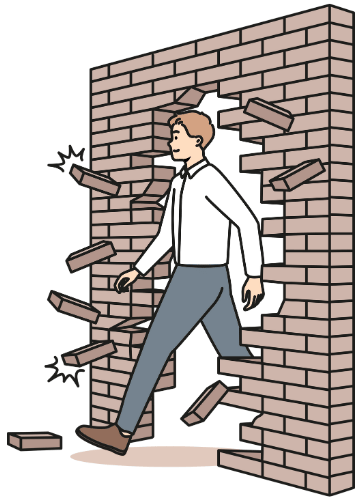
While that sounds unfair or scary, it also frees you from the victim mentality that comes as a result of blaming others and complaining about situations.
Of course, not everything is your fault.
Terrible things happen to us, many outside of our control.
For example, someone can bump their car into yours. And that will give you valid reasons to be upset and angry at the other person.
But will venting your anger and frustration make you feel better?
No, right?
And how will it make them feel?
More or less cooperative?
While you’re not always responsible for what happens to you, you’re always able to choose your response (read: response-able).
Plus, by choosing an empathic and compassionate response, you avoid potential conflict and increase the cooperativeness of others.
Radical responsibility + radical compassion = personal freedom.
How can you transform your pain and suffering into power?
#8: Design a personal retreat
To find your way again, you sometimes need to step away from the noise and demands of everyday life. Changing your environment can also be a powerful catalyst for self-discovery and personal growth.
Designing personal retreats can provide you with the space and time needed to think, reflect, and recharge. While it doesn’t mean you must go to an exotic location – it can certainly help.
A retreat can be as simple as dedicating a weekend to disconnect from your routine. Turn off your devices and focus on nourishing activities like writing, reflecting, exercising, meditating, and reading the best self-help books.
Design a solo retreat with the goal of self-reflection.
Go to a place where you can be with your thoughts, perhaps in nature, and set an agenda that focuses on introspection and strategic thinking.
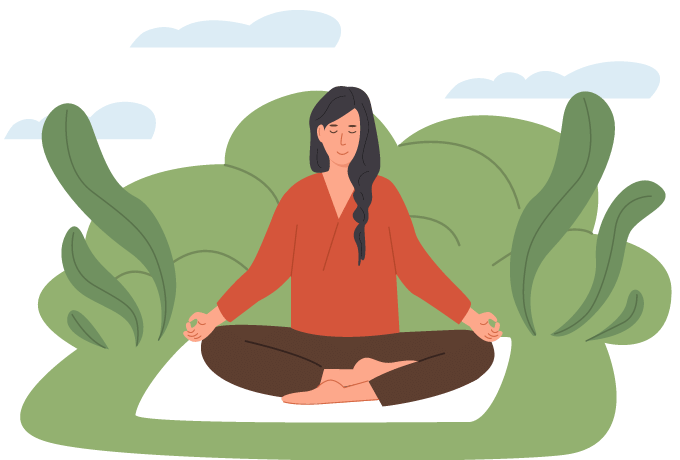
#9: Volunteer for an unfamiliar cause
Sometimes, you just need to get outside your head when you’re feeling lost in life. And serving others is a great way to relieve your own suffering.
Volunteering can offer fresh perspectives.
And it can renew a sense of purpose in your life.
Choose a cause that piques your interest, dedicate a portion of your time to it, and immerse yourself in the experience. The act of giving back is a powerful way to find meaning and direction.
Closing thoughts
I’ve felt lost many times, from struggling with self-identity to misalignment in my career. And I’m currently struggling with losses in my relationships.
These are not just personal anecdotes—they are universal experiences that remind you that at some point, you will feel lost. It’s simply the winter season of your life.
However, with the coping skills in this article, you’ll be equipped to handle whatever life throws at you. While it won’t make the challenges easier, it will instill confidence in your ability to deal with adversity – and overcome life’s challenges.
Key takeaways:
- Feeling lost in life or your career can be unmotivating, but it’s part of the human experience. Like the winter season of life, it won’t last forever.
- Negative emotions can be your greatest catalyst for self-improvement, self-discovery, positive change, and future success.
- Developing coping techniques won’t help you avoid the winter season, but it will make you more resilient and productive.
Further resources:
- Best guided journals for personal growth
- Best books about finding your life’s purpose
- Best self-help books to improve yourself
Take action: Set time aside for a one-hour Personal Clarity Session. Sit somewhere quiet, ask yourself where you feel lost, and write down the areas of your life where you’re seeking change. Reflect on the coping strategies discussed and choose one to implement moving forward.
Do you want to navigate life’s uncertainties with more grace and empowerment? Sign up to receive weekly insights and strategies to live a more fulfilling life!

